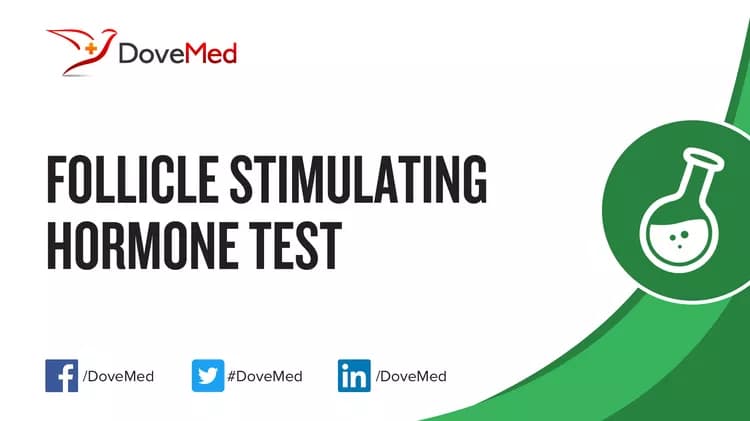
Follicle Stimulating Hormone (FSH) Test
What are the other Names for this Test? (Equivalent Terms)
- FSH (Follicle Stimulating Hormone) Test
What is Follicle Stimulating Hormone (FSH) Test? (Background Information)
- Follicle Stimulating Hormone (FSH) is produced by the anterior pituitary gland in the brain. It stimulates the growth and maturation of ovarian follicles in females, and controls sperm production in males
- In females, the menstrual cycle is divided into two phases:
- Follicular phase - before ovulation
- Luteal phase - after ovulation
- During the follicular phase, FSH stimulates the production of estradiol; while during the luteal phase, FSH promotes progesterone production
- FSH secretion is under control of the gonads (ovaries in women and testes in men) and hypothalamus, situated in the brain
- FSH levels are assessed under the following conditions:
- To evaluate the cause of infertility in males and females
- To investigate disorders of the pituitary gland
- Gonadal dysfunction
- Early puberty and delayed puberty
What are the Clinical Indications for performing the Follicle Stimulating Hormone (FSH) Test?
Indications for Follicle Stimulating Hormone Testing include:
- Infertility in men or women
- Early puberty or delayed puberty
- The stoppage of menses, or irregular menses in women
- Evaluation of women with ovarian cysts or polycystic ovarian syndrome (PCOS)
How is the Specimen Collected for Follicle Stimulating Hormone (FSH) Test?
Sample required: Blood
Process: The sample is drawn through a needle inserted into the vein (arm).
Preparation required: None. In females, FSH Test is performed during certain specific times of their menstrual cycle.
What is the Significance of the Follicle Stimulating Hormone (FSH) Test Result?
The normal blood levels of Follicle Stimulating Hormone, called the reference range for FSH, may vary slightly from lab to lab. Hence, most lab reports come with a reference range, which is used in that particular centre. One such reference range, in wide use, is per the following:
Men
- Before puberty: 0-5.0 mIU/mL (milli-international units/milliliter)
- At puberty: 0.3-10.0 mIU/mL
- Adult: 1.5-12.4 mIU/mL
Women
- Before puberty: 0-4.0 mIU/mL
- At puberty: 0.3-10.0 mIU/mL
- During menstruation: 4.7-21.5 mIU/mL
- After menopause: 25.8-134.8 mIU/mL
Primary ovarian or testicular failure, leads to increased levels of FSH, while a low level of FSH due to pituitary or hypothalamic disorders, leads to secondary ovarian or testicular failure.
Some disorders that maybe associated with abnormal Follicle Stimulating Hormone levels include:
- Ovarian failure due to:
- Lack of development (termed agenesis) of the ovaries
- Turner’s syndrome (a chromosomal abnormality)
- Radiation or chemotherapy
- Testicular failure due to:
- Lack of development (termed agenesis) of the testes
- Klinefelter’s syndrome (a chromosomal abnormality)
- Injury or infections, like mumps
- Radiation or chemotherapy
- Ovarian or testicular tumors
- Adrenal tumors
- Thyroid disorders
- Polycystic ovarian syndrome (PCOS)
- Precocious puberty (early-onset of puberty)
The laboratory test results are NOT to be interpreted as results of a "stand-alone" test. The test results have to be interpreted after correlating with suitable clinical findings and additional supplemental tests/information. Your healthcare providers will explain the meaning of your tests results, based on the overall clinical scenario.
Additional and Relevant Useful Information:
- Medications like clomiphene, cimetidine, digitalis, and levodopa, increase FSH values
- FSH is lowered by oral contraceptive pills, hormone treatments, and phenothiazines
Certain medications that you may be currently taking may influence the outcome of the test. Hence, it is important to inform your healthcare provider, the complete list of medications (including any herbal supplements) you are currently taking. This will help the healthcare provider interpret your test results more accurately and avoid unnecessary chances of a misdiagnosis.
Related Articles
Test Your Knowledge
Asked by users
Related Centers
Related Specialties
Related Physicians
Related Procedures
Related Resources
Join DoveHubs
and connect with fellow professionals

0 Comments
Please log in to post a comment.